February 4th, 2023: Greetings from Austin. We had our annual ice storm this week but we are back in the 60s today. Looking forward to getting outside and bike riding again. This week’s issue is a fun one, diving into my attempts to get into cooking.
#1 Finding On-Ramps To Learn New Things
I’ve been getting into cooking in the past few weeks and am excited about it which has surprised me. For a long time, I had the story that “I probably don’t care about food enough to really get into cooking, I’ll just be efficient and cook whatever is good enough.”
Despite this, I’ve taken many small steps over the last few years to try to learn more about cooking, learning recipes from my aunt, learning knife skills, watching a couple of YouTubers, and even going through a two-month Blue Apron phase.
Yet it never quite clicked. I couldn’t find a way in to stay excited.
This changed for me in one week.
A few weeks ago, I saw this post from
with a bunch of recommendations in his cooking newsletter:I had originally followed him during my Blue Apron phase last year. We might call this phase “pre-excitement” where we just start randomly buying things and trying to get into things, even if we fail. I sense this is where many people give up. They take their false starts as proof that they can’t learn the thing.
I had never taken any action from any of his newsletters but for some reason, his excitement about the “Olio Nuovo,” a term for the first harvest of a season of olive oil, inspired me to instantly buy a bottle.
Over the past year, I’ve been trying to practice a form of instant action, which is my attempt to lower the time from having a thought to taking some action on it. I sense this is vital while being self-employed but has also helped me level up my skills in Djing, Figma, Yo-Yo, and digital marketing over the last year.
I’ve also been trying to host more events and a thought in early January quickly turned into a reflection lunch for a bunch of creators in Austin. The night before the meetup my friend asked Myles to join. I had known he was in Austin but never thought to reach out.
During the lunch I mentioned I want to learn how to cook in 2023, driven by my aspiration to be able to cook good (not just butter pasta) meals for Angie after her birth. It sounds nice but let’s be honest, I was still talking about this with only two months to go and hadn’t taken any real action.
Myles generously offered to be my cooking sherpa. I knew this was a chance I had to take. I was ready to climb Everest despite not knowing if I’d give up at base camp.
In one coffee conversation, however, he dramatically altered my perspective on learning how to cook and I was filled with an excitement that was missing in previous attempts.
Here are a few things that I think helped shift my perspective:
“Cooking Is Easy”: He lowered the stakes and positioned cooking as something that was not too hard to learn. This felt wrong when he said it but is actually a useful framing for a beginner that does not quite know the depths of what he is about to discover.
Someone Who Likes Helping Amateurs Get Into Cooking: Myle genuinely loves cooking, helping others get into it, and is still learning himself. There’s something about being around people like this that always motivates me to want to follow their path.
Narrow Focus: He suggested I limit my focus two a couple of dishes just to get good at them. This also seems obvious now but for some reason before this conversation my conception of learning how to cook involved many dishes and many ingredients. He told me to just get good at one dish I could serve to a group and cook it over and over.
Homework: He told me to buy Kenji’s, The Food Lab.
The book arrived the next day and as soon as I dove into the introduction I knew this was a huge missing piece. I’m not sure if this is a perfect book for all beginners or if I just felt like Kenji was a kindred spirit with his time at MIT, his annoying habit proclivity for questioning any and all authorities, and his need to test everything out himself.
That’s when I stumbled upon something he wrote that nearly broke my brain.
“Cooking is science.”
What the hell?! How could I have overlooked this basic fact? I had been glorifying cooking as something done by professionals in good kitchens with magical skills. You must know a broad range of spices, recipes, and advanced techniques.
Nope, just science.
Finally, I had some use for all those thermodynamics, materials engineering, physics, and chemistry classes in college.
This made me excited to learn about the materials of pots and helped me pull the trigger on a meat thermometer, stainless steel saute pan, and something called a saucier (it makes me feel damn fancy just saying this).
It made sense why Myles recommended this book too. By making fun of how serious other chefs are and how they make some basic cooling mistakes, Kenji also made me feel like I could be good at cooking despite knowing next to nothing.
Here’s the vibe: “If there are three rules that I think would make the world a better place if everyone followed them, it'd be these: challenge everything all the time, taste everything at least once, and relax, it's only pizza.”
And this has taught me a vital lesson about trying to learn things. Don’t just try to learn the thing, find people who can show you how to get excited about it. Find a book by someone like Kenji and find your Myles.1 In other words, look for a portal into a new way of seeing the thing you want to learn.
(This would probably be a good time to subscribe to Myles's substack)
Back to The Food Lab
Kenji is an outsider and I love it. He is driven by a deep curiosity at the beginning of his path. Here he is on questioning why things are done certain ways:
“Why do I have to cook pasta in a huge volume of water? Why does it take so much longer to bake a potato than to boil it? How come my pancakes always suck? And what's really in baking powder anyway? I made a pact with myself then and there that as soon as I was finished with college, I'd never again do anything that I didn't enjoy doing.”
I imagine this makes him annoying in the food world but to someone who has not worked in a restaurant all I can think is, “Yes! those are good questions!”
And since cooking is science, I can ask questions and experiment too! Let’s go, baby.
I’ve now cooked an olive oil and garlic pasta dish four times and each time I learned a little more about heat, ingredients, the magic of butter, and using pasta water. By the fourth, I even had enough confidence to go for the white wine clam version. Looks pretty cool on our cute pink bowl plates, huh?
And sometimes I fucked up. But because cooking is science and I’m just trying to cook the same dishes, this is just information!
Seeing learning how to cook as a bunch of experiments has somehow lowered the bar for me dramatically and made learning to cook a very lightweight proposition.
And after two weeks I’ve accomplished the most important thing when learning things: a basic level of confidence and a clear view of a path to keep learning. This will be easy now. There is no goal to become good, just a long game of running more experiments.
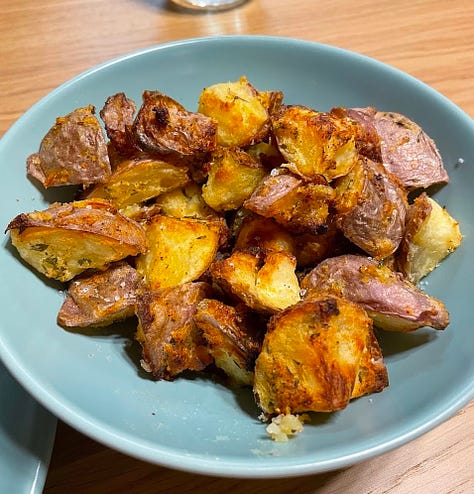
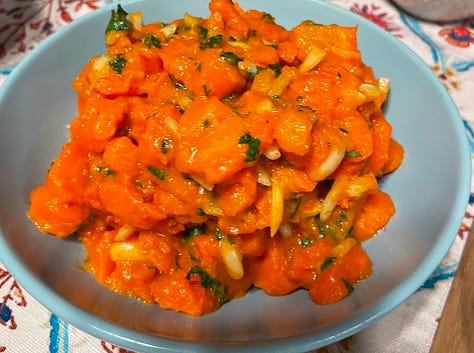
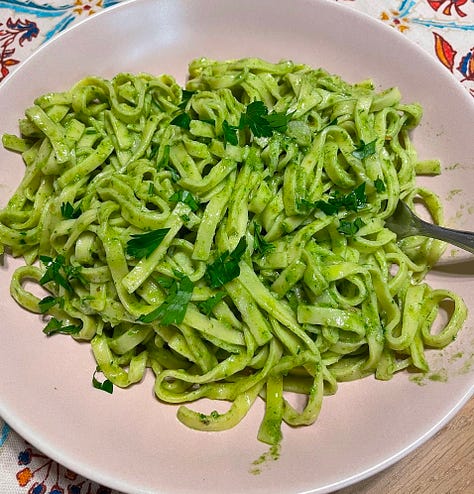
While I don’t think cooking is the “real work” of my life I am excited for it to become a bigger part of it.
It was cool to read, however, how cooking definitely is the work that matters to Kenji:
“Like a head-injury patient who suddenly develops a brand-new personality, something snapped the moment my hand touched a knife in a professional kitchen. I was no longer in control of my own destiny”
What have you been holding off on learning? How can you find a new way in?
#2 The Art of Sabbaticals
I had an incredible episode on sabbaticals this week with two first-timer podcast guests,
and Cécile Marion. They crushed it. We talked about how they both took breaks from work over the last year and what they learned.Topics included:
How Michelle is living on $1,000 a month in the US
How Cécile learned to trust her intuition again
Why Michelle decided to extend her sabbatical
How they both re-framed how they thought about money
How travel played a role in Cécile mindset shifts
How they have improved their relationships to work
After the call, Cécile was inspired to start being more proactive in helping people plan and get the most out of their sabbatical experiences. She has more information here about booking a call with her if you are interested.
#3 In Your 50s and Curious About “Pre-Retirement”?
In a weekly live group curiosity conversation this week in the Find The Others community, Don Ball was trying to gain clarity on an idea he’s been thinking about for a while.
How do you navigate “pre-retirement”?
Here are his rough ideas:
If you’re in your 40s or 50s, you might think it’s too late to jump onto any path other than the one you’re on. You might have grown kids, elderly parents, a well-paying job and, ahem, less gumption than you had in your 20s.
All these factors are real – and might keep you from ever acting on your dissatisfaction with your status quo.
He wants to help himself (and others) navigate this unscripted block of life and wants to talk to people about it. Here’s who he’s looking for:
Are you over 50?
Do you worry about your career decline?
Do you honestly wonder what you will do in retirement?
Are you creeped out by the thought of spending 20+ years golfing (or insert any retirement cliche)?
Perhaps you worry about being able to afford retirement?
Have you had an entrepreneurial itch that you haven’t scratched (and wonder if perhaps it’s too late for you)?
If you’d be interested in talking with Don to help him learn (and hopefully write about this), shoot him an email with thoughts or set up a time:
#4 Work Relationship
I think most people should write out a mini-manifesto of their own personal relationships to work. Work is a much bigger part of our lives than we realize and most people are running other people’s scripts. I sense there is way more wiggle room and flexibility in how we are working and in our mindset toward work.
This is what a friend, Andrew Lynch, did this week in an amazing thread. He’s one of the many people I know who are working full-time and have spent a lot of time thinking about how work fits into their lives.
Here is his reflection:
I reject type-A ambition. I don't want to work for Goldman.
I reject hustle culture. I don't want multiple side gigs.
I also reject digital nomadism, indie-hacking, anti-work, FAT FIRE, Coast FIRE, SEO-passive-income, and any other attempt to reduce work to a three word labelI like working as part of a team.
I like working -- mostly in person -- in a company where we're all striving to deliver something customers want, in a way that's profitable, sustainable, good for the local economy, and that gets me home by 6pm most nights.I believe it doesn't have to be crazy at work. That you can be ambitious and want your company to grow and make money, while working a fairly standard 40 hour work week.
You can do this without sacrificing your health, your family life, or your friendships.My people are people like @jasonfried, who build amazing companies while working 4 days a week in the summer.
People like @ChristineCarril who teach people how to grow companies without burning themselves out.People like Cal Newport and @RyanHoliday who have careers, family lives, podcasts, best-selling books, and more -- seemingly without working all hours of the day.
Is this easy? I don't think so. It requires deep thought and discipline.
It requires you to identify what you actually want. I'm not chasing a partnership at Allen & Overy just because others are. I'm not chasing the next VP promotion.So on a macro level, I'm working towards the life that I have decided is meaningful to me -- regardless of what others think. That's not easy.
And on a micro-level, my "ambitious and home by 6 pm" mentality means being ruthless and disciplined during the day.
I choose only to focus on that which is important. What, ten years from now, will actually matter?As much as possible, avoiding day-to-day minutiae, instead, making incremental, daily progress on big important things which on any given day may not look like much but a decade from now, will look like incredible achievements.
Also, I want to do all this while tweeting 3-4 times a day, is that doable?
This is in part inspired by my buddy @p_millerd who is doing wonderful work, questioning default assumptions about life and work
You should all read his bookThis is also inspired by someone I met at a party a few years ago
At the time I was working for an SME up in the northeast of England, and she worked for a management consulting firm in LondonAfter a few mins talking to her in my rudimentary french, she stopped me and said, "wait, Andrew, you clearly have some level of talent -- why are you working for that little company in the north? why aren't you doing an important job in London?"
at the time I didn't know how to answer that -- and thought for a long time that my choice to reject that type A ambition must have been cope
I wasn't good enough to handle it so I rejected it.
To test this hypothesis, I went to work for a type-A ambitious company and I did really well! I got great performance reviews and got promoted and realised, that's not what I wanted
Not because of cope.
I just don't want to get emails on a Saturday afternoon asking me to amend the slide deck ahead of a 9 am Monday meetingBecause work is a huge part of my life. I love being good at my job. I love helping my company succeed.
At the same time, it’s not my whole life, and it’s not my identity.
Original source:

#5 $500 Essay Content
I announced a $500 essay contest in February and it looks like it has encouraged a bunch of people to start writing which is awesome.
Or become a subscriber to get instant access and join:
Shoutouts
I connected with Ashley Davis about four years ago. She was one of my early curiosity conversations when my calendar wasn’t so full. She was working in sustainability but like many in that field felt like the “impact” she was hoping for didn’t quite emerge.
She eventually left her job and has been coaching other professionals in similar spots and hosting retreats in Sri Lanka. She’s hosting another one in May this year and I offered to share it with this newsletter (no affiliate or anything).
It’s happening May 7 - 18 and you can learn more here.
Thanks For Reading!
I am focused on building a life around exploring ideas, connecting and helping people, and writing. If you’d like to support my journey, the best ways are to:
Buy or listen to my book, The Pathless Path (or message me if you want to bulk order at a lower price)
I’m looking for sponsors for 2023 for this newsletter or podcast. Please reach out or book a package here directly.
Subscribe to my podcast and leave a review
Join Find The Others if you want to hang with like-hearted generous weirdos. Here are some of the upcoming events:
Feb 7th, 4 pm CST: Monthly First Tuesday "Find The Others" Social
Feb 10th: Live Curiosity Convo + Q&A - Lindsay Honori: freelance & digital presence
Feb 12th: Speed-write your first draft
Feb 12th: Co-Writing & Mastermind Session with Vinamrata
In addition, I recommend all of the following services (affiliate links): Riverside.fm for HD podcasting, Transistor for podcast hosting, Podia or Teachable for courses, Skystra for WordPress Hosting, and Circle for running a community
A reminder: I don’t check unsubscribe alerts and never look at my subscriber list. So if you feel like unsubscribing, you can do so below.
Funny enough it’s made me realize that almost everything I learned in 2022 had this sort of setup. I learned design from Nate Kadlac, marketing from Mike Newton, Yo-Yo from a random guy on Instagram via Zoom lessons, and Djing from a DJ in Austin.


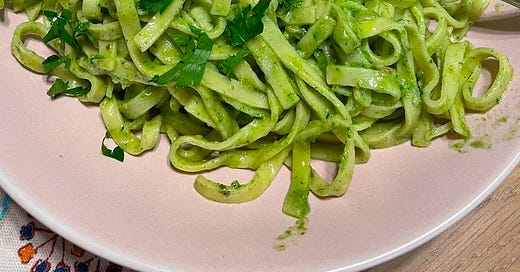



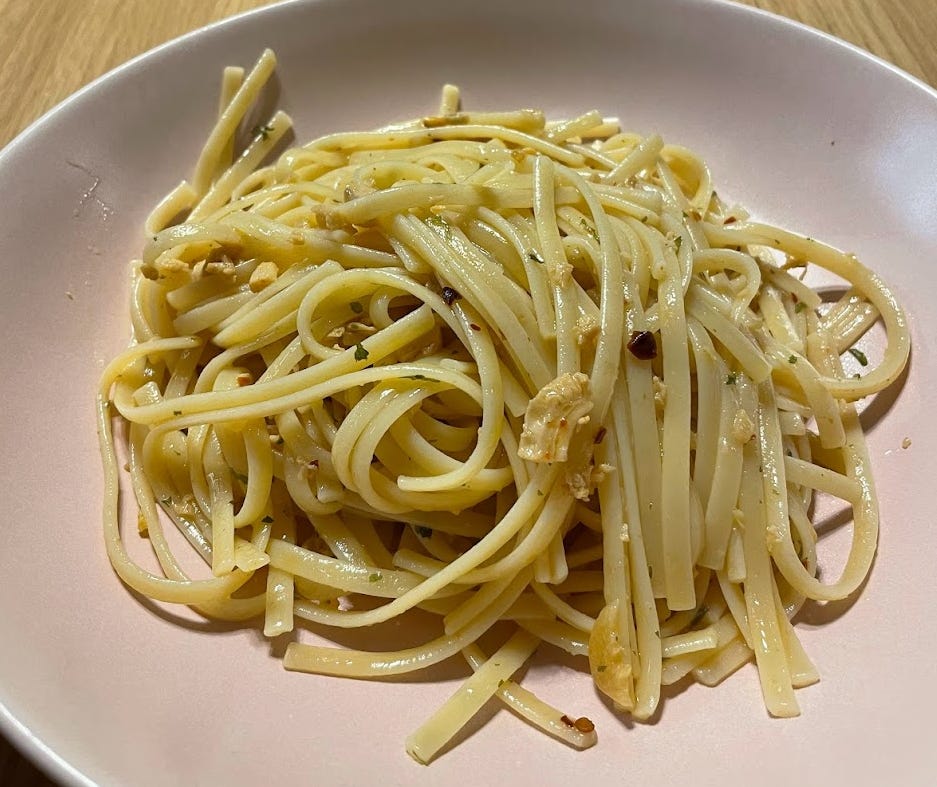
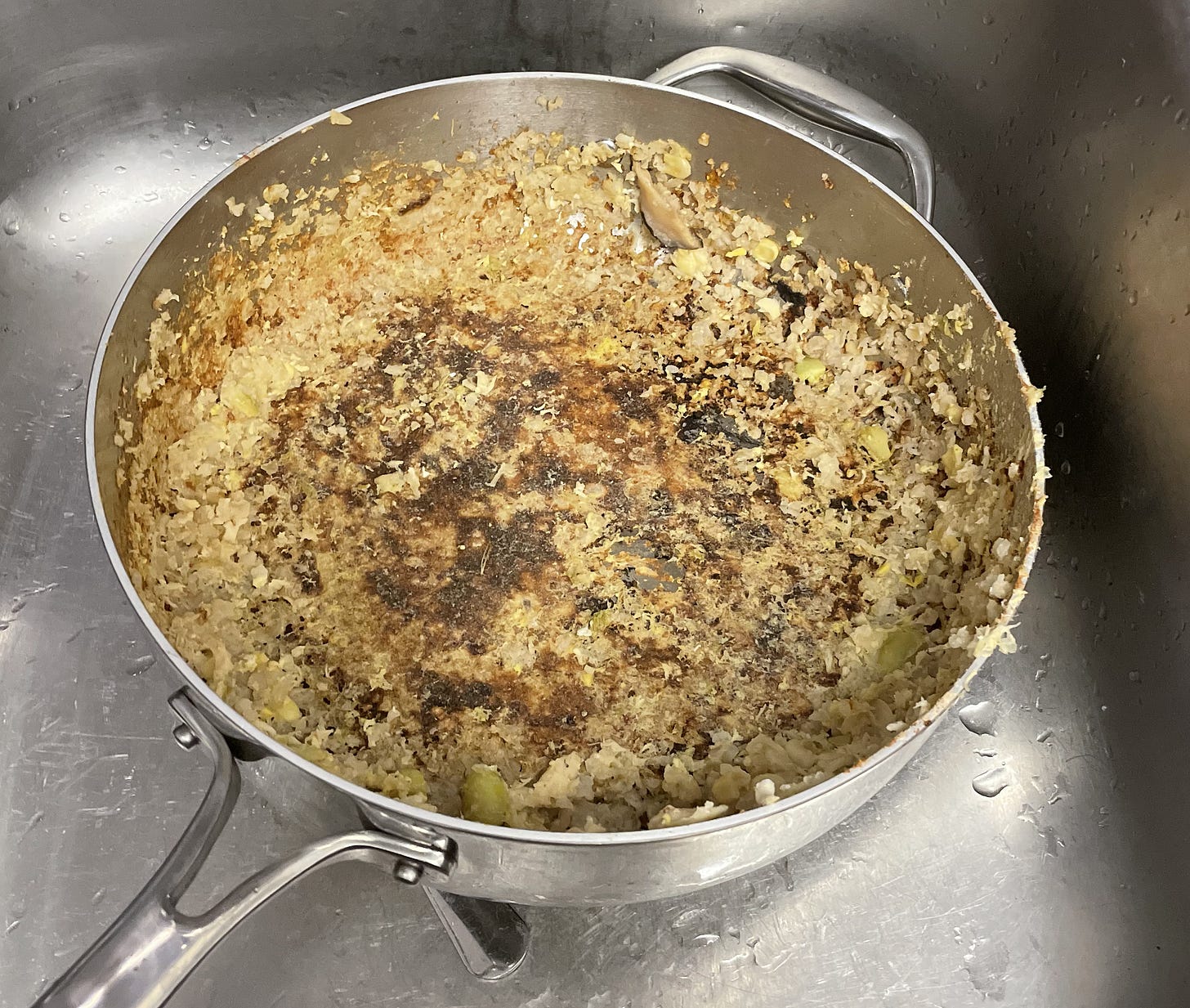
This is great Paul. I just saw Miles’ thread about cooking and have been wondering what my 2 dishes to learn will be--that’s such a good aproach. I also Ithink about my relationship to work all the time. I’ve also written about it. I’d be curious if you had any prompts or guides for how someone might evaluate their relationship to work in their life. Like, “x# questions to consider to write the mini-manifesto of your relationship to work.” If you don’t have something, would love to jump on Zoom and pick your brain and draft something up.
Welcome to Team Cooking!
Food Lab is far and away my #1 desert island pick for cookbooks. Currently working my way through Flour Water Salt Yeast—sort of the Food Lab of bread baking.